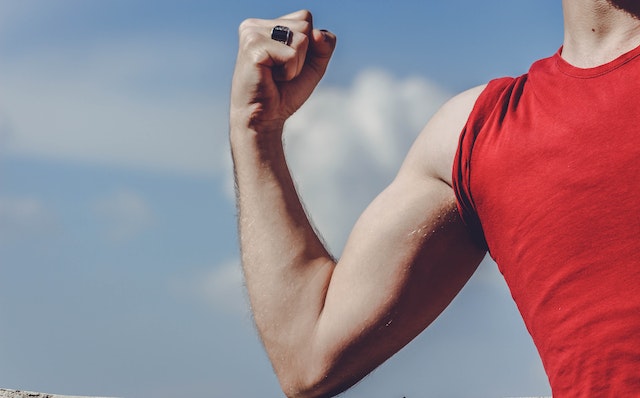
Why do we get hot when we exercise? Because heat is a byproduct of the process muscles use to make energy.
Let’s look at how we get energy to our muscles. We are unable to make our own energy, we can only convert one energy source into another. We have to eat plants or animals in order to take their stored energy. This energy is stored as either carbohydrate, protein, or fat. When the food we eat gets to our stomach and intestines, the energy is taken out and processed by the liver. The liver does this using enzymes that break down carbohydrates. The energy can be stored in the liver, or it can be sent to the muscles and stored there. Leftover energy is stored as fat. The liver stores energy as glycogen, which is made up of many connected glucose molecules. Glucose molecules are simple sugars.
Now, let’s look at how a muscle works. There are obviously different types of muscles. We’re not looking at muscles like the heart muscle, because they work automatically. Muscles are made up of muscle fibers. Each fiber is made up of a block of proteins called myofibrils. The myofibrils have filaments, a little like rachets, that can fold together when given an electrical signal, shortening the muscle. The fibers are collected together in bundles and each bundle is wrapped in a transparent sheath called a perimysium. Different muscles have different numbers of fibers, but an average male bicep has about 253,000. The myofibril proteins contain a specialized protein called myoglobin and molecules that can provide oxygen and energy to the muscle.
When we want to move a muscle, the brain sends an electrical signal. This passes down the nervous system in the spinal cord and along a very thin cell called an axon. The axon is connected to a muscle and when the signal reaches the muscle, the myofibrils slide over each other using the filaments and rachet together. This makes the muscle shorter and it contracts. When the electrical signal stops, the myofibrils slide back to their original position and the muscle relaxes.
Ok. This brings us to the energy. When the myofibrils are stimulated to move, they need energy to do it. The type of energy they need is called adenosine triphosphate (ATP). Our body has stored all of the energy that we have eaten, but it is stored as glycogen. Some of it is in the muscles, some in the liver, and some as fat. When we command our muscles to move, the first thing that happens is the muscles use the ATP that they have stored since the last time the muscle was contracted. The muscle will typically have enough ATP to last for about 3 seconds. During these 3 seconds, the muscle will use all of the creatine phosphate it has stored to rapidly produce more ATP. This will give the muscle another 10 seconds. While this is being used, and if it is necessary, the muscle will start to convert the glycogen it has stored into ATP. The heart rate and the lungs have not sped up enough to supply more oxygen to the muscle yet, so the glycogen will be converted without oxygen. This produces lactic acid as a byproduct and is not sustainable. The body can put up with this for about 90 seconds. However, by this time, the heart and lungs have increased the supply of oxygen to the muscle and it can use aerobic respiration. This is where glycogen is converted to ATP in the presence of oxygen. The body can do this for as long as it still has glycogen to break down.
So, why do we get hot when we exercise? There are two reasons. Firstly, after the muscles have made ATP, they have to get the energy out of it. They do that by breaking it into two pieces. That reaction releases the energy that they need, but the muscles are only 25% efficient. That means that 25% of the energy is used to power the muscle contraction and the remaining 75% is released into the surrounding tissue as heat. 25% doesn’t sound very efficient, but we are more efficient than a car engine. However, we are far less efficient than the wildebeest which can use 62.6% of the energy it has. The second reason we heat up is because of friction. This is only a small part of the heat that we get, but it is there. The body slowly warms up and we have to sweat to keep the body from overheating. The water on the surface of our skin evaporates and takes energy with it, cooling us down.
So, why do we heat up when we exercise? Because our muscles are only 25% efficient and when they take the energy out of ATP, they release 75% of it as heat. And this is what I learned today.
Sources
https://www.ccmr.cornell.edu/faqs/how-does-your-body-move-does-the-brain-send-it-messages/
https://en.wikipedia.org/wiki/Skeletal_muscle
https://my.clevelandclinic.org/health/articles/23509-glycogen
https://www.medicalnewstoday.com/articles/319322#Calcium-stimulates-contraction
https://en.wikipedia.org/wiki/Adenosine_triphosphate
https://www.fsps.muni.cz/emuni/data/reader/book-4/04.html
https://www.livestrong.com/article/361702-why-does-body-temperature-increase-during-exercise/
https://www.betterhealth.vic.gov.au/health/conditionsandtreatments/muscles

[…] from producing ATP. ATP is vital for muscle cells to use oxygen to make energy. Without it, the muscles cannot function. The diaphragm and the heart are two of the most important muscles in the body. If […]